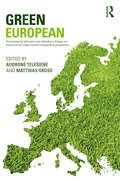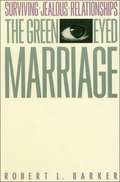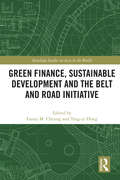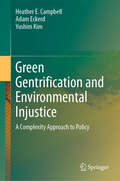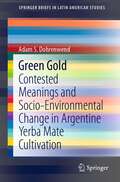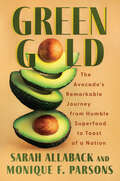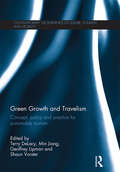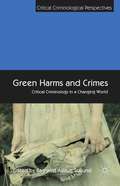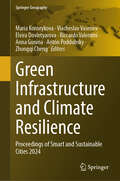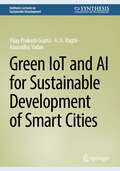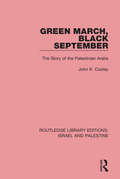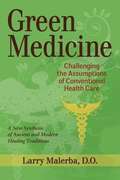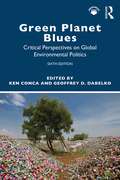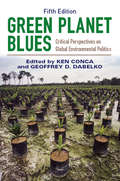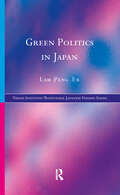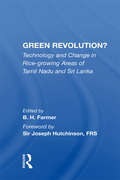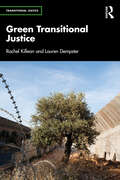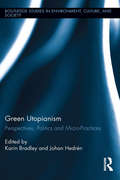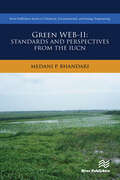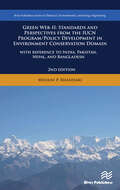- Table View
- List View
Green European: Environmental Behaviour and Attitudes in Europe in a Historical and Cross-Cultural Comparative Perspective (Studies in European Sociology)
by Audrone Telesiene Matthias GrossGreen European addresses the quest for a better understanding of European type(s) of environmentalism. This monograph focuses on public attitudes and behaviours and the culturally rooted as well as country specific differences. The book addresses the wider issue that many European countries are rendered ‘green’ or as having an advanced environmental awareness, but the question - ‘how green are Green Europeans really’, is yet to be answered. The book covers a variety of unique data-driven comparative studies and is divided into three parts: the first addresses perceptions of environmental and technological threats and risks, the second part deals with environmental activism in Europe, the third discusses environmental attitudes, environmental concerns and their imminent link to personal pro-environmental behaviour. The empirical comparative nature of the contributions is enabled by data from the International Social Survey Programme (ISSP).
Green Eyed Marriage
by Robert L. BarkerIn this honest, sympathetic book, marital and family therapist Robert L. Barker offers real help for men and women suffering the emotional costs of a jealous partner's suspicion and rage. Based on his extensive work with troubled couples, "The Green-Eyed Marriage" answers these and many other questions about pathological jealousy and its causes and offers practical techniques to minimize jealous confrontations and control them.
Green Finance, Sustainable Development and the Belt and Road Initiative (Routledge Studies on Asia in the World)
by Fanny M. Cheung Ying-yi HongCan China’s Belt and Road Initiative (BRI) promote sustainable development, alongside its primary aims of increasing commercial connectivity with China’s partners? In discussions of the BRI the focus has tended to be on the implications for infrastructure construction, connectivity, and economic diplomacy. Rather less attention has been paid to its potential impact on sustainability. The initiative has not only set principles to prevent climate change and promote sustainable development, but also pledged to align with the UN’s environmental objectives. The contributors to this volume describe and evaluate the consequent policy coordination in the areas of green finance, green energy, and sustainable development in the Belt and Road regions. They examine both the challenges and opportunities of these projects, and the role that Hong Kong can play in supporting their assessment, finance, and implementation. With contributions from authors based in mainland China, Hong Kong, Australia, Qatar, the UK, and the US – with experience in corporate social responsibility, international finance, environmental policy, and international relations – this book presents a thorough and rigorous analysis of the green side of the BRI. A valuable resource for scholars of the BRI and its many implications for China, its partners, and the development of sustainable infrastructure.
Green Gentrification and Environmental Injustice: A Complexity Approach to Policy
by Heather E. Campbell Yushim Kim Adam EckerdThis book argues that, given the complex nature of the urban environment, we cannot find one optimal solution to reducing environmental injustice, in part because there is no singular cause. Environmental injustice emerges in particular settings because of the combined and interdependent effects of a variety of different policy and community characteristics. The authors argue that addressing these interlinked problems requires an understanding of the clusters of community and contextual factors that combine in a variety of ways to both create problems and imply policy approaches to managing them. They argue for the use of complexity-informed methods to assist in making public policy choices, such as Qualitative Comparative Analysis (QCA) and Agent-based Modeling (ABM), to enable us to better identify plausible solutions for specific contexts. This volume offers a new perspective for strategically managing urban policy that considers the risk of gentrification and gentrification-related displacement, with the ultimate goal of improving social justice. Environmental injustice, pollution remediation, gentrification, and displacement are interlinked problems, all of which impinge on social justice in US cities. However, public policy research, and often practice as well, has tended to separately consider urban policy issues such as environmental injustice, brownfields and other pollution remediation, how to redevelop neighborhoods, and how to contend with gentrification and displacement. In this book the authors take a new perspective to such intertwined urban policy issues, using complexity thinking and, more importantly, complex adaptive systems approaches, in order to develop context-sensitive policy approaches to managing these ongoing problems.
Green Gold: Contested Meanings and Socio-Environmental Change in Argentine Yerba Mate Cultivation (SpringerBriefs in Latin American Studies)
by Adam S. DohrenwendThis book applies an approach to study the externalization of cost under capitalism in the production of Argentine yerba mate, an infusion with stimulant properties long used by indigenous peoples. Consumption in today’s globalized economy makes it difficult to understand the consequences of our actions across the globe. A political-ecological lens, informed by the work of Robert Sack and Ian Cook, can help guide an analysis that geographically reconstructs supply chains and reveal the realities of consumption. The use of yerba mate has become a cornerstone of Argentine society and identity, and yerba mate processors are working to expand exports globally. In Argentina’s Misiones Province, the heart of yerba mate production, the true costs of production are borne by the children, the impoverished laborers, and the environment of Argentina’s Atlantic Rainforest. These consequences of modernity, along with the efforts of an NGO to remedy them, are presented and assessed.
Green Gold: The Avocado's Remarkable Journey from Humble Superfood to Toast of a Nation
by Sarah Allaback Monique F. ParsonsA lively and engrossing cultural history of the avocado and the people who transformed it into an American obsession &“Whether you&’re a history buff or just enjoy a chip full of guacamole, you&’ll be thoroughly captivated . . . Green Gold is a well researched, captivating story.&” —Rick Bayless, James Beard Award-winning chef, author, and restaurateurThe avocado is the quintessential symbol of aspirational living, a ubiquitous agricultural favorite, and the driver of an $18 billion global industry. How did this regional Latin American staple become a star of Super Bowl ads and a byword for wellness? Documenting more than a century of cross-cultural cooperation, cutting-edge science, and savvy marketing, Green Gold tells the remarkable story of the fruit&’s rise to prominence as both a culinary and cultural juggernaut.Anchored by the story of two exceptional trees that stood out among hundreds of rivals, Green Gold is a spirited and often surprising behind-the-scenes look at how dedicated avocado enthusiasts in Mexico and California developed an ideal fruit to sell to the world. Navigating the Depression, two world wars, Mexican revolutions, violent drug lords, drought, and disease, these pioneers were driven by the avocado&’s potential to captivate the palates and hearts of consumers across the globe. Their efforts, inspired by the success of California citrus, launched today&’s lucrative industry and helped the avocado win a place among such supermarket staples as oranges and bananas.Set against the rise of Southern California as an economic and cultural powerhouse and featuring delightful recipes (including vintage versions of guacamole and avocado toast), Green Gold is an entertaining and far-ranging exploration of the avocado&’s journey to a central place in the American diet and global imagination.
Green Growth and Travelism: Concept, Policy and Practice for Sustainable Tourism (Contemporary Geographies of Leisure, Tourism and Mobility)
by Min Jiang Terry DeLacy Geoffrey Lipman Shaun VorsterThe green growth paradigm emerged from evolving global strategies that coherently promote a more socially inclusive, low-carbon, resource-efficient, stable economy, with decreasing poverty. Opportunities and challenges associated with the paradigm shift are expected to transform the travel and tourism (travelism) sector in all respects and on a global scale. This involves the transformation of the entire travelism value chain, as well as the communities in tourism destinations. However, there is a lack of systematic reports on wide-ranging and complex implications of the green growth paradigm for the travelism sector. This book focuses on the twin pillars – green growth and travelism – as key building blocks in exploring an essential multi-decade lifestyle change for planetary and human well-being, through the lenses of concept, policy and practice. It provides a conceptual discussion of the implications of the new development trend for key players in the travelism system, offers case studies from both developed and developing countries that highlight key issues in the transformation towards the green economy, and explores the policy settings and frameworks on both the global and national levels that underpin travelism green growth. This book offers tourism industry players, academics, students, policy makers and practitioners a comprehensive discussion of the latest progress in green growth and travelism.
Green Harms and Crimes
by Ragnhild Aslaug SollundThe book presents discussions of the application of Stan Cohen's theories alongside empirical contributions in the fields of critical and green criminology. Taken together, the authors critically address harms and crimes against the environment, as well as against human and nonhuman victims.
Green History: A Reader in Environmental Literature, Philosophy and Politics
by Derek WallGreen History traces the development of ecological writing through history and forms a broad critical review of green ideas and movements reinforcing the importance of environmental concern and action in our own time. Animal rights, ecology as science, feminism, green fascism/socialism/anarchism, land reform, peaceful protest, industrialization, ancient ecology, evolution, grassroots activism, philosophical holism, recycling, Taoism, demographics, utopias, sustainability, spiritualism ...all these issues and many more are discussed. Authors include Alice Walker on massacre in the City of Brotherly Love, Aldous Huxley on progress, Lewis Mumford on the organic outlook, Engels on natural dialectics, Thoreau on the fontier life, the Shelleys on vegetarianism and playing God, Bacon on the New Atlantis, Hildegard of Bingen on green vigour, the unknown writer of the Bodhisattva and the Hungry Tigress and Plato on soil erosion. Each article is set within its historical and thematic context. A full introduction and a guide to further reading are also provided.
Green Infrastructure and Climate Resilience: Proceedings of Smart and Sustainable Cities 2024 (Springer Geography)
by Riccardo Valentini Elvira Dovletyarova Viacheslav Vasenev Zhongqi Cheng Maria Korneykova Anna Gunina Anton PoddubskyThis book covers the integration of green-gray infrastructure and the development of climate-resilient cities. Climate change and urbanization are the principal global environmental challenges. Up to 70% of the world population is projected to live in cities by 2050. How will this rapid urbanization alter the face of the world? What are the environmental consequences of megacities&’ expansion? What are smart solutions to make life in cities safe, comfortable and environmentally friendly? These and other important questions are addressed by the conferences Smart and Sustainable Cities (SSC). This year&’s theme for the conference will be «Green infrastructure and climate resilience». Cities are considered the main sources of anthropogenic greenhouse gases emission. Air and water quality, vegetation and soils in cities are exposed to anthropogenic influence. Studying negative environmental consequences of the anthropogenic and technogenic pressures is among the key tasks of urban ecology and environmental impact assessment. On the contrary, urban green infrastructure provides a wide range of ecosystem functions and services critical to human well-being and urban sustainability under climate change. The following topics are planned for discussion at the conference: green infrastructures for sustainable and healthy cities; climate mitigation, adaptation and carbon neutrality; soil and water management under global changes; advances in environmental monitoring of urban and technogenic ecosystems; biodiversity of urban soils and green infrastructures.
Green IoT and AI for Sustainable Development of Smart Cities (Synthesis Lectures on Sustainable Development)
by A. K. Haghi Vijay Prakash Gupta Anuradha YadavA Smart City is an urban area in which digital technology is used to connect the infrastructure and services to improve the efficiency of the city&’s operations and the quality of life of its population in terms of mobility, energy, security, housing, and more. This book describes the systems and the infrastructure requirements of smart cities and explores how the integration of the Green Internet of Things (G-IoT) and Artificial Intelligence (AI) help improve the efficiency and safety of cities&’ systems, as well as reduce costs. The book provides useful information for researchers, policymakers, urban planners, and technology leaders.
Green March, Black September: The Story of the Palestinian Arabs (Routledge Library Editions: Israel and Palestine #4)
by John K. CooleyIn March 1968 Palestinian guerrillas and Jordanian troops combined forces to respond to Israeli raids into Jordan, provoking visions of new unity and future military success. Yet by September 1970 mounting friction between the Palestinian guerrillas in Jordan and King Hussein’s regime came to a head with the hijackings at Dawson’s Field and the defeat by Jordan’s forces of the Palestinians. The savagery of the fighting and the bitter consequences for the Palestinian guerrillas gave this month the name Black September: a name that was to reappear ominously in months to come. Who are the Palestinians? Many people only became aware of their existence because of terrorism, particularly the Black September operation at the Munich Olympics. Yet the Palestinians are at the very heart of the Middle East problem, and this book, first published in 1973, tells their story. The core of the book describes the emergence of the various guerrilla groups, joined by Palestinians hopeful of regaining lost land and lost dignity, and the ideologies and differences of the groups. There are personal interviews with some of the main leaders, and other chapters examine the relationships and interaction between the Palestinian groups and the Soviet bloc, the Chinese, the Third World, the West, and most important, the Israelis themselves.
Green Medicine
by Larry MalerbaAccording to Dr. Larry Malerba, modern medicine has perfected the short-term technical repair of the physical body at the expense of the long-term psychological and spiritual well-being of the whole person. In Green Medicine he examines this issue and provides a realistic blueprint for wellness and a valuable guide for those seeking deeper and more lasting healing. Written in an accessible style, the book draws on a rich range of fields--physics, philosophy, Jungian thought, shamanism, alchemy, Eastern thought, Western esotericism, sustainability, orthodox medicine--to create a green medical paradigm that represents a powerful integrative medical perspective.Dr. Malerba interweaves case histories from his own practice with innovative concepts from alternative and Western medicine in order to address a number of crucial questions: * What are the personal and environmental costs to the overuse of pharmaceutical drugs?* Is conventional medicine as scientific as it claims to be?* How can conventional doctors and alternative healers begin to work together? * How can individuals transform medicine and become participants in their own healthcare? Green Medicine offers a practical and philosophical basis for building a viable green alternative that draws on the inherent unity of body, heart, mind, soul, and nature.From the Trade Paperback edition.
Green Men & White Swans: The Folklore of British Pub Names
by Jacqueline SimpsonWhy do British pubs have such curious names? What tales lie behind the Moonrakers, the Hooden Horse, the Derby Tup? And why does the Green Man come in different shapes and sizes?In Green Men & White Swans, leading folklorist Jacqueline Simpson explores the fascinating stories behind pub names, uncovering the myths and legends, euphemisms and wordplays, heroes and even ghosts that have inspired pub landlords over the centuries. Spanning beloved locals from the Three Witches to the Three Nuns, from the Ashen Faggot to the Twa Corbies, this book is both an intriguing insight into the history of the British pub and a captivating journey through the country's dramatic past.
Green Planet Blues: Critical Perspectives on Global Environmental Politics
by Ken Conca Geoffrey D. DabelkoRevised and updated throughout, this unique anthology examines global environmental politics from a range of perspectives and captures the voices of both the powerless and the powerful. Paradigms of sustainability, environmental security, and ecological justice illustrate the many ways environmental challenges and their solutions are framed in contemporary international debates about climate, water, forests, toxics, energy, food, and biodiversity. Organized thematically, the selections offer a truly global scope. Seventeen new readings explore climate justice, globalization, land and water grabs, climate change and conflict, China’s international environmental relations, and the future of climate politics in the wake of the Paris Agreement. This book stresses the underlying questions of power, interests, authority, and legitimacy that shape environmental debates, and it provides readers with a global range of perspectives on the critical challenges facing the planet and its people. This new edition of Green Planet Blues connects directly with a wide-range of upper-level undergraduate and graduate-level courses.
Green Planet Blues: Critical Perspectives on Global Environmental Politics (5th Edition)
by Ken Conca Geoffrey D. Dabelko<p>Revised and updated throughout, this unique anthology examines global environmental politics from a range of perspectives (contemporary and classic, activist and scholarly) and reflects voices of the powerless and powerful. Paradigms of sustainability, environmental security, and ecological justice illustrate the many ways environmental problems and their solutions are framed in contemporary international debates about climate, water, forests, toxics, energy, food, biodiversity, and other environmental challenges of the twenty-first century. Organized thematically, the selections offer a truly global scope. Seventeen new readings discuss climate justice, environmental peacebuilding, globalization, land grabs, corporate environmentalism, climate adaptation, gender, disaster risk, resilience, and the future of global environmental politics in the wake of the 'Rio+20' global summit of 2012. <p>This book stresses the underlying questions of power, interests, authority, and legitimacy that shape environmental debates, and it provides readers with a global range of perspectives on the critical challenges facing the planet and its people.</p>
Green Politics in Japan (Nissan Institute/Routledge Japanese Studies #10)
by Lam Peng-ErAn important comparative study of Japanese politics that reveals that green issues have yet to displace the traditional urban politics of post-industrial Japan. This is unlike the rise of green parties and politics in Europe. Unlike Europe, it seems that political values in Japan are still informed by the conservative values of hierarchy and deference.
Green Porno: A Book and Short Films by Isabella Rossellini
by Isabella RosselliniFrom the beloved actress Isabella Rossellini comes Green Porno, a strange and enlightening visual exploration of the sex lives of insects and sea creatures, based on the wildly popular short videos of the same name. Co-director Jody Shapiro has taken 125 arresting film stills of Isabella dressed in animal costumes which are the centerpiece of Green Porno and will appear alongside narrative text describing the “love making” process of each animal. Each chapter will also include a quirky, surprising facts about each species.
Green Retreats
by Stephen BendingGreen Retreats presents a lively and beautifully illustrated account of eighteenth-century women in their gardens, in the context of the larger history of their retirement from the world whether willed or enforced and of their engagement with the literature of gardening. Beginning with a survey of cultural representations of the woman in the garden, Stephen Bending goes on to tell the stories, through their letters, diaries and journals, of some extraordinary eighteenth-century women including Elizabeth Montagu and the Bluestocking circle, the gardening neighbors Lady Caroline Holland and Lady Mary Coke, and Henrietta Knight, Lady Luxborough, renowned for her scandalous withdrawal from the social world. The emphasis on how gardens were used, as well as designed, allows the reader to rethink the place of women in the eighteenth century, and understand what was at stake for those who stepped beyond the flower garden and created their own landscapes.
Green Revolution?: Technology And Change In Rice-growing Areas Of Tamil Nadu And Sri Lanka (Cambridge Commonwealth Ser.)
by B. H. Farmer Joseph HutchinsonAs will be made clear in the pages that follow, this book is based on a field research project focused on rice-growing and undertaken in parts of North Arcot District in Tamil Nadu (India) and of Hambantota and Mon-eragala Districts, Sri Lanka. We use 'S.E. Sri Lanka' as shorthand for the whole of the latter study area, and 'Hambantota District' for the part of it which falls in that District. Except where the context requires otherwise, the present in our book refers to 1973-4; while 'Randam' and 'Paha-lagama' are fictitious names for real villages. The project was an inter-disciplinary one, involving workers qualified in economics, geography, hydrology, sociology, statistics and the study of the administration of development.
Green Ribbons and Turbans: Young Iranians Against the Mullahs
by Joanna Oseman Armin ArefiDuring the last presidential election in Iran, nonviolent protestors defied the mullahs' power by wearing green ribbons on their wrists. In June of 2009, the inhabitants of Tehran were living underground to escape the government's authority, strangled by interdictions, dreaming of freedom and revolution. Mahmoud Ahmadinejad, president of the Islamic Republic of Iran and desperate to maintain his power, defeated his opponent, Mahmoud Mousavi, by massive electoral fraud. The resulting frustration and anger throughout the country sparked a gigantic wave of opposition. The Green Movement was born.In this timely, politically relevant, and unique account of life in Iran, Arefi takes us to a world removed from the usual cultural and political clichés about Iran and lets us hear the voices of a new generation of Iranians, who have never known anything but religious dictatorship and repression. He also tells the stories of the first victims of repression-Neda, Sohrab, and Taraneh.
Green Transitional Justice (Transitional Justice)
by Rachel Killean Lauren DempsterThis book rethinks the boundaries of transitional justice, urging scholars and practitioners to confront the often-overlooked nexus between mass violence and ecological harm.Through an in-depth analysis of the field’s limitations – such as its anthropocentric legalism, neocolonial practices, and alignment with neoliberalism – the book critiques the historical marginalisation of Nature in transitional justice discourse and practice. It argues that ignoring environmental harm not only undermines the possibility of holistic justice but also perpetuates structural violence and inequality. In response, the book sketches a ‘greener’ transitional justice, integrating principles from environmental justice, Indigenous knowledge systems, and ecocentric perspectives. It explores the possibilities of recognising Nature as a victim of mass violence, adapting existing mechanisms to incorporate environmental harm, and fostering transformative approaches premised on the interdependence of human and ecological well-being.This book is written for students, researchers, and practitioners of transitional justice and fields related to conflict transformation, peacebuilding, environmental protection, and development.
Green Utopianism: Perspectives, Politics and Micro-Practices (Routledge Studies in Environment, Culture, and Society #2)
by Karin Bradley Johan HedrénUtopian thought and experimental approaches to societal organization have been rare in the last decades of planning and politics. Instead, there is a widespread belief in ecological modernization, that sustainable societies can be created within the frame of the current global capitalist world order by taking small steps such as eco-labeling, urban densification, and recycling. However, in the context of the current crisis in which resource depletion, climate change, uneven development, and economic instability are seen as interlinked, this belief is increasingly being questioned and alternative developmental paths sought. This collection demonstrates how utopian thought can be used in a contemporary context, as critique and in exploring desired futures. The book includes theoretical perspectives on changing global socio-environmental relationships and political struggles for alternative development paths, and analyzes micro-level practices in co-housing, alternative energy provision, use of green space, transportation, co-production of urban space, peer-to-peer production and consumption, and alternative economies. It contributes research perspectives on contemporary green utopian practices and strategies, combining theoretical and empirical analyses to spark discussions of possible futures.
Green Web-II: Standards and Perspectives from the IUCN (River Publishers Series In Chemical, Environmental, And Energy Engineering Ser.)
by Medani P. BhandariIn dealing with the IUCN, one must bear in mind that there never has been, and undoubtedly never will be, any other organization even remotely resembling it. Its peculiarities, subtleties and complexities are sometimes mind-boggling (Nicholson 1990 in Holdgate 1999: ix). Green Web-II investigates IUCN's role in global biodiversity conservation policy as well as in national program development in India, Pakistan, Nepal and Bangladesh. It explores how nature protection priorities and approaches are promoted or addressed by IUCN, an international organization, and how environment conservation policies are created and maintained in states with different capacities of South Asia. It also evaluates IUCN's competency in bio-diversity, climate change, nature conservation and environmental policy formulation at global, regional and country level. This study is the first detailed scholarly study on the IUCN as an organization as well as on its efforts in biodiversity conservation. This book adds to our knowledge, firstly by contributing to a small but growing body of work on the sociology of international organizations. IOs, especially International Governmental Organizations (IGOs), have long been the subject of mostly political science. Secondly, it applies a fuller sociological imagination to the study of IOs by critically exploring one of the largest and most active nature conservation organizations in the world. Thirdly, it also explores how the IUCN actually goes about building protectoral programs with individual member nations. Additionally, the book explores the recent development of the green economy (GE) concepts into IUCN's program planning today. The green economy initiative applies a people-first approach. Although the concept is relatively new, this research explores the theoretical development of a green economy and illustrates how this theory is applied in IUCN's program planning to program implementation.
Green Web-II: Standards and Perspectives from the IUCN Program / Policy Development in Environment Conservation Domain - with reference to India, Pakistan, Nepal, and Bangladesh
by Medani P. BhandariThis second edition of the book, “Green Web-II: Standards and Perspectives from the IUCN Program / Policy Development in Environment Conservation Domain- with reference to India, Pakistan, Nepal, and Bangladesh” investigates the IUCN’s role in global biodiversity conservation policy as well as in national program development in India, Pakistan, Nepal and Bangladesh. It explores how nature protection priorities and approaches are promoted or addressed by IUCN, and how environment conservation policies are created and maintained in states of South Asia with different capacities. It also evaluates IUCN's competency in biodiversity, climate change, nature conservation and environmental policy formulation at the global, regional and country levels.This book adds to our knowledge firstly by contributing to a small but growing body of work on the sociology of international organizations. International Governmental Organizations (IGOs), have previously been mainly the subject of political science. Secondly, it critically explores one of the largest and most active nature conservation organizations in the world. Thirdly, it also explores how IUCN actually goes about building protectoral programs with individual member nations. Finally, the research also shows the historical development of global institutions and IUCN’s activities with member nations in helping to define or redefine the concept of global governance. The outcomes of this research will also be beneficial for global collaboration, networking, and for the identification of common concerns among the many environmental and conservational organizations at the international and national level. In this broader sense, the research outcomes might be beneficial to constituencies of the global North as well as global South because of the nature and coverage of IUCN and its role in conservation policy formation. This effort may serve as a model for additional research on international organizations.Technical topics discussed in the book include: The Motivation for Environmental Conservation- How personal efforts make a difference The Role of International Environment Conservation Organizations The Political Economy of Organizations, Network theory, Institutional theory, Stakeholder theory, Governance theory Governance performance and Competitiveness Popularity indices Knowledge creation and diffusion Conservation commons
